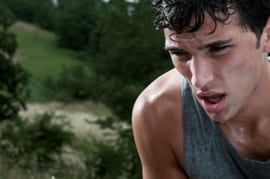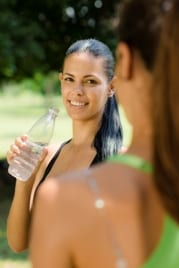 Summer has only just begun and many regions have already experienced record heat. Many athletes are participating in off-season, post-season, and pre-season workouts. Workouts that include vigorous exercise and training in the summer heat can predispose athletes to develop heat illnesses. These illnesses can range from minor to life-threatening complications that need immediate medical attention.
Summer has only just begun and many regions have already experienced record heat. Many athletes are participating in off-season, post-season, and pre-season workouts. Workouts that include vigorous exercise and training in the summer heat can predispose athletes to develop heat illnesses. These illnesses can range from minor to life-threatening complications that need immediate medical attention.
Our body’s natural defense mechanism against heat is to sweat and at times this mechanism can fail. When sweating occurs, water evaporates from your skin removing heat from the core of your body as long as blood is flowing properly to your skin. Humidity and dehydration during the summer can make it harder for sweat to evaporate, putting individuals at increased risk for heat illnesses. Athletes, coaches, and parents must be aware of the common symptoms, initial treatments, and preventative measures of heat illnesses. Always seek professional medical care if you suspect heat-related illnesses.
Heat Cramps – a heat injury that occurs when participating in strenuous exercise in the heat. Symptoms range from feeling faint or dizzy, to weakness, profuse sweating, and of course muscular cramps. Heat cramps present as severe pain that can occur in individual muscle groups, abdomen, and/or throughout the body. Once the symptoms arise, it is best to move into a cool location. Gently massage the muscle groups involved to help relieve spasms and lightly stretch the involved area. Begin consuming small amounts of cool water every 15 minutes to help hydrate the body and the involved area.
Heat Exhaustion – a heat injury that occurs when participating in strenuous exercise with exposure to heat for a prolonged period. An individual’s sweating mechanism for keeping body temperatures cool becomes altered. Symptoms range from a weak pulse, pale and moist skin, nausea, dizziness, weakness, headaches, and disorientation. Once the symptoms arise, the individual needs to lie down in a cool place. Clothing needs to be loosened and/or removed with the application of cool, wet clothes. Begin consuming small amounts of cool water every 15 minutes as long as the individual is not nauseated. If vomiting begins, seek immediate medical attention.
 Heat Stroke – a heat injury that develops quickly with minimum warning and can be life-threatening. The body’s cooling system fails and the individual’s body temperature increases significantly. Symptoms range from a very high body temperature (105+ degrees F); hot, dry red skin (no sweating), fast pulse rate, confusion, shallow breathing, and at times loss of consciousness. The individual needs to have immediate medical assistance. 9-1-1 should be called and/or the individual be taken to a hospital immediately. Remove clothing and begin cooling the individual as quickly as possible with a cool bath, sponging, or ice packs to reduce body temperature. Intravenous fluids for rehydration must be given to aid in the reduction of organ failure.
Heat Stroke – a heat injury that develops quickly with minimum warning and can be life-threatening. The body’s cooling system fails and the individual’s body temperature increases significantly. Symptoms range from a very high body temperature (105+ degrees F); hot, dry red skin (no sweating), fast pulse rate, confusion, shallow breathing, and at times loss of consciousness. The individual needs to have immediate medical assistance. 9-1-1 should be called and/or the individual be taken to a hospital immediately. Remove clothing and begin cooling the individual as quickly as possible with a cool bath, sponging, or ice packs to reduce body temperature. Intravenous fluids for rehydration must be given to aid in the reduction of organ failure.
Preventing Heat Illness and Dehydration
Avoid exercising during the hottest times of the day by exercising early in the mornings, just after sunrise, or late in the evenings before sunset. It is critical to stay hydrated. Drink 16-to-20 ounces of liquids every hour (water preferably and Gatorade or Powerade-type sports drinks for electrolyte replacement). Wear loose clothing that aids in the evaporation process of sweat which helps regulate body temperatures. It is also beneficial to use sunscreen to prevent sunburn that can alter the body’s natural cooling process.
Be sensible when it comes to the heat of the summer. Ultimately if you feel thirsty then you are dehydrated. Drink plenty of fluids and replenish electrolytes. Don’t put yourself in a situation that can be life-threatening. Be aware of symptoms early in your workout regimen or routine. Don’t ignore the initial symptoms because they can get worse quickly. Always seek professional medical care if you suspect heat-related illnesses. Listen to your body and “stay hydrated my friends”.
